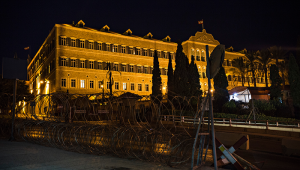web_beirut_istock-546787062.png

Beirut, Lebanon. Image © iStock
Titled ‘The Great Denial’, the paper savaged the ruling class for “capturing the state and living off its economic rents”, not only causing the crisis but continuing once it began.
Lebanon now has few public services, paralysing political discord and mass brain drain, while the poor and middle class suffer, the World Bank said, while the elite continue to prevaricate.
“Deliberate denial during deliberate depression is creating long-lasting scars on the economy and society,” said Saroj Kumar Jha, World Bank Mashreq regional director.
“Over two years into the financial crisis, Lebanon has yet to identify, least of all embark upon, a credible path toward economic and financial recovery.”
The crisis is “one of the top ten, possibly top three most severe economic collapses worldwide since the 1850s”, according to the report.
The World Bank estimates real GDP fell by 10.5% in 2021, after dropping by 21.4% the year before.
In dollar terms GDP fell from nearly $52bn in 2019 to an estimated $21.8bn in 2021 – a 58.1% contraction, the largest fall of 193 countries – the paper said.
Government revenues fell to an estimated 6.6% of GDP in 2021 – the third-lowest in the world after conflict-hit Somalia and Yemen.
After an explosion at a port in the capital city Beirut in August 2020 brought Lebanon to international attention, a group of international leaders, notably French president Emmanuel Macron, began calling for systemic change in the country.
Macron outlined a series of reforms that would need to be made in order for Lebanon to qualify for international help, perhaps including a bailout deal with the International Monetary Fund and loans from the World Bank.
The World Bank report has called for a new monetary policy framework to stabilise the currency, a debt restructuring programme to bring its debt to sustainability, a “comprehensive restructuring” of the financial sector, fiscal adjustment to restore confidence in public finances, enhanced social protection and growth-boosting reforms.
“The government of Lebanon urgently needs to move forward with the adoption of a credible, comprehensive and equitable macro-financial stabilisation and recovery plan and accelerate its implementation if it is to avoid a complete destruction of its social and economic networks and immediately stop irreversible loss of human capital,” said Jha.












